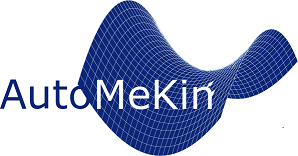Difference between revisions of "AutoMeKin"
(→News) |
(→News) |
||
| Line 102: | Line 102: | ||
AutoMeKin now includes '''barrierless channels'''. However, these channels are not considered in the kinetics. | AutoMeKin now includes '''barrierless channels'''. However, these channels are not considered in the kinetics. | ||
| − | AutoMeKin has been interfaced with [https://www.entos. | + | AutoMeKin has been interfaced with [https://www.entos.ai/qcore/documentation/ '''Entos Qcore'''] |
AutoMeKin has been interfaced with '''BXDE''' to enhance its efficiency ([https://onlinelibrary.wiley.com/doi/full/10.1002/syst.201900024 <span style="font-size:100%"> R. A. Jara-Toro et al. ChemSystemsChem doi: 10.1002/syst.201900024</span>]). | AutoMeKin has been interfaced with '''BXDE''' to enhance its efficiency ([https://onlinelibrary.wiley.com/doi/full/10.1002/syst.201900024 <span style="font-size:100%"> R. A. Jara-Toro et al. ChemSystemsChem doi: 10.1002/syst.201900024</span>]). | ||
Revision as of 13:06, 19 November 2021
Contents
Introduction
AutoMeKin (formerly tsscds) has been designed to discover reaction mechanisms in an automated fashion. Transition states are located using MD simulations and Graph Theory algorithms. Monte Carlo simulations afford kinetic results. The only input is a starting structure in XYZ format. The method is described in these two publications: 1 2. At present MOPAC2016, Entos Qcore and Gaussian 09 (G09) are interfaced with AutoMeKin. The program has been tested on the following Linux distros: CentOS 7, Red Hat Enterprise Linux and Ubuntu 20.04 LTS.
To give you a flavor of the capabilities of the program you can try our web interface
Developers team
Emilio Martinez-Nunez, Carles Bo, George L. Barnes, Diego Garay-Ruiz, David R. Glowacki, Sabine Kopec, Daniel Pelaez-Ruiz, Aurelio Rodriguez, Roberto Rodriguez-Fernandez, Robin J. Shannon, James J. P. Stewart, Pablo G. Tahoces and Saulo A. Vazquez
Address
Departamento de Química Física, Facultade de Química, Avda. das Ciencias s/n, 15782 Santiago de Compostela, SPAIN
email me
License
MIT License
Copyright (C) 2021 George L. Barnes, David R. Glowacki, Sabine Kopec, Emilio Martinez-Nunez, Daniel Pelaez-Ruiz, Aurelio Rodriguez, Roberto Rodriguez-Fernandez, Robin J. Shannon, James J. P. Stewart, Pablo G. Tahoces and Saulo A. Vazquez
Permission is hereby granted, free of charge, to any person obtaining a copy of this software and associated documentation files (the "Software"), to deal in the Software without restriction, including without limitation the rights to use, copy, modify, merge, publish, distribute, sublicense, and/or sell copies of the Software, and to permit persons to whom the Software is furnished to do so, subject to the following conditions:
The above copyright notice and this permission notice shall be included in all copies or substantial portions of the Software.
THE SOFTWARE IS PROVIDED "AS IS", WITHOUT WARRANTY OF ANY KIND, EXPRESS OR IMPLIED, INCLUDING BUT NOT LIMITED TO THE WARRANTIES OF MERCHANTABILITY, FITNESS FOR A PARTICULAR PURPOSE AND NONINFRINGEMENT. IN NO EVENT SHALL THE AUTHORS OR COPYRIGHT HOLDERS BE LIABLE FOR ANY CLAIM, DAMAGES OR OTHER LIABILITY, WHETHER IN AN ACTION OF CONTRACT, TORT OR OTHERWISE, ARISING FROM, OUT OF OR IN CONNECTION WITH THE SOFTWARE OR THE USE OR OTHER DEALINGS IN THE SOFTWARE.
Install the code
To install the code follow the Installation instructions
Tutorial
Download tutorial
Program execution
Unless you donwloaded the singularity container (in that case skip this step), to start using any of the scripts of the program, load the amk/2021 module:
module load amk/2021
To run the low-level calculations use:
nohup llcalcs.sh molecule.dat ntasks niter runningtasks >llcalcs.log 2>&1 &
where:
molecule is the name of your molecule
ntasks is the number of tasks
niter is the number of iterations
runningtasks is the number of simultaneous tasks
To run the high-level calculations use:
nohup hlcalcs.sh molecule.dat runningtasks >hlcalcs.log 2>&1 &
For more details, follow the instructions given in the tutorial
Reference
If you use AutoMeKin, please cite the following publications:
- E Martínez-Nuñez, G.L. Barnes, D.R. Glowacki, S. Kopec, D. Pelaez, A. Rodriguez, R. Rodriguez-Fernandez, R.J. Shannon, J.J.P. Stewart, P.G. Tahoces, S.A. Vazquez, J. Comput. Chem. 2021, 42, 2036
- E. Martínez-Núñez J. Comput. Chem. 2015, 36, 222
- E. Martínez-Núñez Phys. Chem. Chem. Phys. 2015,17, 14912
- J. J. P. Stewart, MOPAC2016, Stewart Computational Chemistry: Colorado Springs, CO, USA, HTTP://OpenMOPAC.net, 2016.
If you use the older version tsscds, please cite, instead of ref 1 above, the following one:
Works that employ AutoMeKin
The following works employ AutoMeKin: Works
Changelog
Consult the Latest changes
Web interface
AutoMeKin can be used through our web interface.
News
The Python library amk-tools can be employed to read, process and visualize reaction networks generated by AutoMeKin and is available in the latest container (https://github.com/dgarayr/amk_tools)
AutoMeKin now includes barrierless channels. However, these channels are not considered in the kinetics.
AutoMeKin has been interfaced with Entos Qcore
AutoMeKin has been interfaced with BXDE to enhance its efficiency ( R. A. Jara-Toro et al. ChemSystemsChem doi: 10.1002/syst.201900024).
The method has also been recently generalized in a collaboration with Dani Pelaez and co-workers to study van der Waals structures ( S. Kopec et al. Int. J. Quantum Chem. 2019, 119, e26008 ) and also to generate sum-of-products PESs for quantum dynamics ( R. Panades-Barrueta et al. Frontiers in Chemistry 2019, 7, 576).
Return to Contents
Return to Main_Page

